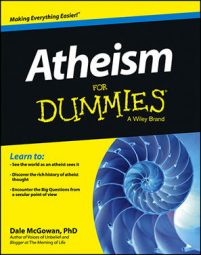No matter what your perspective, the idea of religious atheism is probably a head-spinner at first. If someone said “religion,” the odds are pretty good that “God” is one of the first related words to pop into your head. Religion and God have been joined at the hip from the beginning.
In fact, a person can be an atheist who also considers him or herself religious. Just keep God out of it and you’re good to go. Entirely nontheistic branches of Hinduism and Buddhism have existed for thousands of years, and the Jain religion is completely gods-free.
Religion has always included much more than the worship of a deity. Community, spirituality, the search for meaning, ethics, rites of passage, mutual support, a chance to have a good sing, the experience of beauty and wonder — all these have been part and parcel of the institution of religion.
Though they have usually been framed in theistic terms, not one of these elements relies on the idea of a deity. Some even feel that God gets in the way of the fullest expression of human spirituality, an idea captured in science writer Chet Raymo’s book When God is Gone, Everything is Holy.
So even as they dismiss the idea of God, many atheists express a desire to partake of these very real benefits of religious community in a God-optional or even fully God-less way. Some have built entire movements and denominations to make it happen. They are the religious atheists.
The Ethical Culture movement in religious atheism
The Ethical Culture movement, one such experiment in God-optional religion, was founded in New York by professor and social reformer Felix Adler. Adler had been trained as a rabbi, but his first sermon, given to his father’s congregation in 1873, quickly became his last when he laid out a future for Judaism without once mentioning God.
Four years later, Adler created the Society for Ethical Culture, giving a series a Sunday lectures on ethical issues and forming a mutually supportive community of religious (but God-optional) humanists.
The movement gradually spread to include more than 25 Ethical Societies across the United States, all emphasizing “deed before creed” — that what people do is more important than what people believe. Many members of Ethical Culture are theists; many are atheists. All are religious.
Unitarian Universalists in religious atheism
The 1961 merger of Unitarianism and Universalism, the two most liberal Christian denominations at the time, created a new creedless denomination with the cumbersome eleven-syllable name of Unitarian Universalism.
UUs (as they are mercifully called) gather not around shared belief in a deity or the authority of a sacred text but around seven principles emphasizing such human values as justice, dignity, equity, and compassion. Some UUs are theistic believers of one kind or another, while those who self-identify as humanists, atheists, and agnostics are religious without God.
Humanistic Judaism in religious atheism
In 1963, just two years after the birth of Unitarian Universalism, Rabbi Sherwin Wine announced to his congregation in Windsor, Ontario that he hadn’t believed in God’s existence for quite some time.
Wine invited those who wished to do so to follow him in creating a nontheistic Jewish congregation. Eight families did so.
Wine developed a new humanistic liturgy that reflected Jewish culture, identity, and history while teaching humanist ethics, all without reference to God. It was the birth of Humanistic Judaism, a nontheistic religious movement that now has more than 40,000 members and is recognized as one of the five main branches of Judaism.

